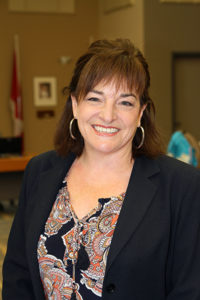Home »

RDEK awaits word on vital grant
The Regional District of East Kootenay (RDEK) is hoping for good news in the next month on the status of its nearly $10 million grant application for a debris flow mitigation project on Cold Spring Creek in Fairmont Hot Springs.

“This grant represents a tremendous opportunity for the community if we are approved, as the capital costs would be 100% funded by the federal and provincial governments,” said RDEK Electoral Area F Director Susan Clovechok. “This project has been rapidly evolving and when this grant was announced RDEK staff acted quickly to get an application submitted prior to the very short deadline. We are now waiting for the application to make its way through the approval channels.”
The RDEK is hoping to hear in the next few weeks whether or not the funding application will be approved; however, recognizing both the significance of this grant opportunity and the potential risk to the community, the RDEK has been working with the Ministry of Municipal Affairs on all options to ensure it is positioned to meet the terms of the grant funding should it be successful.
The Phase 1 Cold Spring Creek Debris Flow Mitigation Project has been in the works for well over a year, but the hazard assessment that was completed as a part of the engineering for the original project identified a more significant level of risk to the community and identified the need for additional mitigation measures.
“As government, one of our jobs is to work to protect public safety and, while we all hope no larger-scale events happen in the future, we are acting as swiftly as we can to provide an increased level of protection to the community,” added Clovechok. “Receiving nearly $10 million dollars in funding would make a profound difference both in terms of what we could achieve, and in reducing the impact to taxpayers.”
Separate and apart from ensuring all of the pieces are in place should the grant be successful, is a necessary increase in taxation in the service area, resulting from the increased frequency of events. In order to maintain the existing flood mitigation infrastructure, pay for the service area share of the 2020 debris flood event response and recovery and to pay for the costs associated with the projects that are not grant eligible, an increase in the maximum requisition limit within the bylaw is needed.
The RDEK is working extensively with the ministry to determine how to meet the timelines associated with the grant and the need to have the required changes in taxation completed.
“There were a number of factors to consider when looking at which process to use to increase the maximum requisition limit for the service area,” explained Clovechok.
The conditions of the grant require a September 30, 2021 construction start. To meet that deadline, the process of awarding the engineering contract and proceeding with detailed design and approvals would have to begin immediately.
The earliest a referendum process could be held was the end of June, which would be too late for the award of the engineering design contract. In addition, if the referendum failed, even by one vote, the RDEK would be required to return the nearly $10 million potential grant and it is unknown when another 100% funded opportunity of this size would be available again.
 As a result, and following discussions with the ministry, the RDEK board unanimously moved to pursue Consent by Director at its March board meeting. The urgency is related to the impending project but the need for the increase to properly maintain the existing infrastructure for public safety is required regardless.
As a result, and following discussions with the ministry, the RDEK board unanimously moved to pursue Consent by Director at its March board meeting. The urgency is related to the impending project but the need for the increase to properly maintain the existing infrastructure for public safety is required regardless.
“The public safety aspect has to be our top priority and is the driving force behind the director consent approach,” added Clovechok.
The RDEK is hoping to hear from the province this month whether the bylaw has received the approval of the Inspector of Municipalities and the Minister. The Risk Assessment report, which provides a more in-depth evaluation of the risks on Cold Spring Creek, will be presented to the RDEK Board at its April board meeting and shared with the community.
“Once we have all of these pieces in place, we will be scheduling a meeting with the community to provide an update on the status of the grant application, a detailed review of the risk assessment, and an overview of the next steps in the project and impacts for taxpayers,” added Clovechok.
While a meeting date has not yet been set, it will likely be in May.
The RDEK has established a project page: engage.rdek.bc.ca/debris and is urging all Fairmont residents who have access to email to make sure they have signed up for the Fairmont email group to receive ongoing project updates.
RDEK









